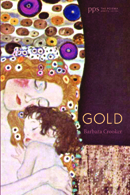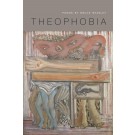Barbara Crooker. Gold. Cascade Books / Wipf and Stock, 2013. 70 pgs. $11.00
Reviewed by Lynn Domina
Gold, Barbara Crooker’s fourth collection, is published as part of Cascade Books’ Poiema Poetry Series which features the work of Christian poets, presumably those whose work reveals their faith commitments. Other authors in the series include such accomplished poets as Sydney Lea and Paul Mariani. Artists of faith (and I include all faith traditions here, although in this review I will adhere to the language of Christianity), when they understand their drive to create as a call, know that part of the responsibility of their gift is to attend to craft, to write as well as they are able. Sometimes such artists assume the role of prophet; sometimes they bear witness. Sometimes their content overtly reveals their religious orientation; sometimes their spirituality enters their work more subtly, in their approach to their material. Either way, these artists recognize that their urge to create forms a significant part of their claim to be made in the image of God. For this reason, I am glad that Cascade Books has created this series, providing space for poets who are serious about their faith and also serious about their art.
Crooker’s poems in this collection are not narrowly religious, but they are faith-filled. They accept life as it is—defined by mortality, for example—even as the speaker sometimes wishes it could be otherwise. Many of these poems have been written out of grief as Crooker mourns her mother’s death, yet they remain firmly invested in this material world. Several of the poems describe her mother’s final illness, particularly as she ate or failed to eat. Among my favorites is “Ambrosia,” the speaker’s mother’s word for everything good. Maybe it was “chicken / in basil cream with Sauvignon Blanc on fresh linguine. / Or a dense chocolate cake, sour cream and hot coffee / in the batter.” But it might have been just a piece of fruit. Or maybe it was a donut, “filled / with the jeweled ooze of jelly.” Her mother ate, attending fully to this bit of the world, “And when she was done, she sighed. Ambrosia.” Ambrosia is, of course, the food of the gods, and according to some stories, it confers immortality. As she hovers in mortality, the speaker’s mother translates her life into the immortal world, not through theological debate or repentance or even prayer, but through her appreciation of the concrete elements of this particular world.
Most of the poems in Gold are brief personal lyrics, with a consistent speaker from poem to poem. They rely on images taken from nature—goldenrod, maple, geese, mockingbird. The speaker listens and sees as she moves through her days. And she thinks—her observations lead to insight, most often to that familiar frustrating paradox: life is full to overflowing and yet we still resist letting go when we must. One poem that illustrates this preoccupation is “Late Prayer,” which opens with an unusual impatience: “It’s not that I’m not trying / to love the world and everything / in it, but look, that includes people / who shoot up schools, not just the blue / bird in his coat of sky,…” Crooker’s line breaks here are particularly effective. The break at line three, for example, after the word “people” suggests initially that attempting to love people in general can be trying, rather than only the people “who shoot up schools.” The poem lists several examples of horrifying or at least annoying types of people, contrasting them with sky and clouds and wind, the aspects of creation that are easier to appreciate. Then, a few lines from the end, the poem shifts its tone. Even as she has become impatient, the speaker remains filled with “wild longing.” She hopes reality consists of more than “shining surfaces.” And she understands that she might fail, too, not because she’s likely to kill someone or harden her heart against her fellow creatures, but simply through a failure of courage: “Will I be strong / enough to row across the ocean of loss / when my turn comes to take the oars?”
In the final section of the book, the poems become more varied in their subject matter, often responding to paintings and other pieces of art. The speaker seems to have emerged from her period of mourning and re-entered the world. My favorite image in the entire book occurs here, at the end of a poem called “Salt”: “Long ago, / someone tipped some salt on a black skillet / and decided to call that spillage ‘stars.’” I was not expecting that metaphor, yet it encapsulates the poem, which situates domestic experience in terms of a transcendent reality.
If I have a quibble with these poems, it is with the preponderance of forms of the verb “to be.” I would prefer more telling, more engaged verbs. A strength of these poems is in their imagery, which we often assume is composed of nouns and adjectives, for we see and hear and touch things. But as we watch those things, they change, even when they seem still. Poems often hinge on the nature of that change, conveyed with verbs. Nevertheless, these poems have called me to observe my own world more mindfully, to name it, to call out to it, and to hear when it calls out to me.
————————————————————————————————————————————– To propose a review or submit a book for review consideration, fill out the contact link.



